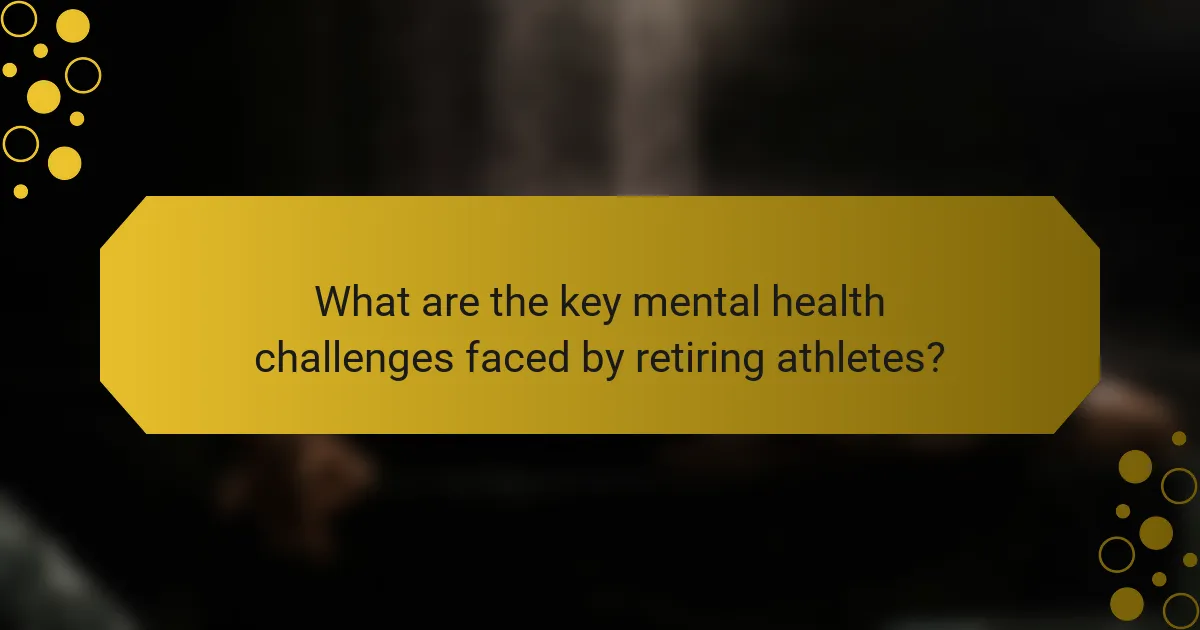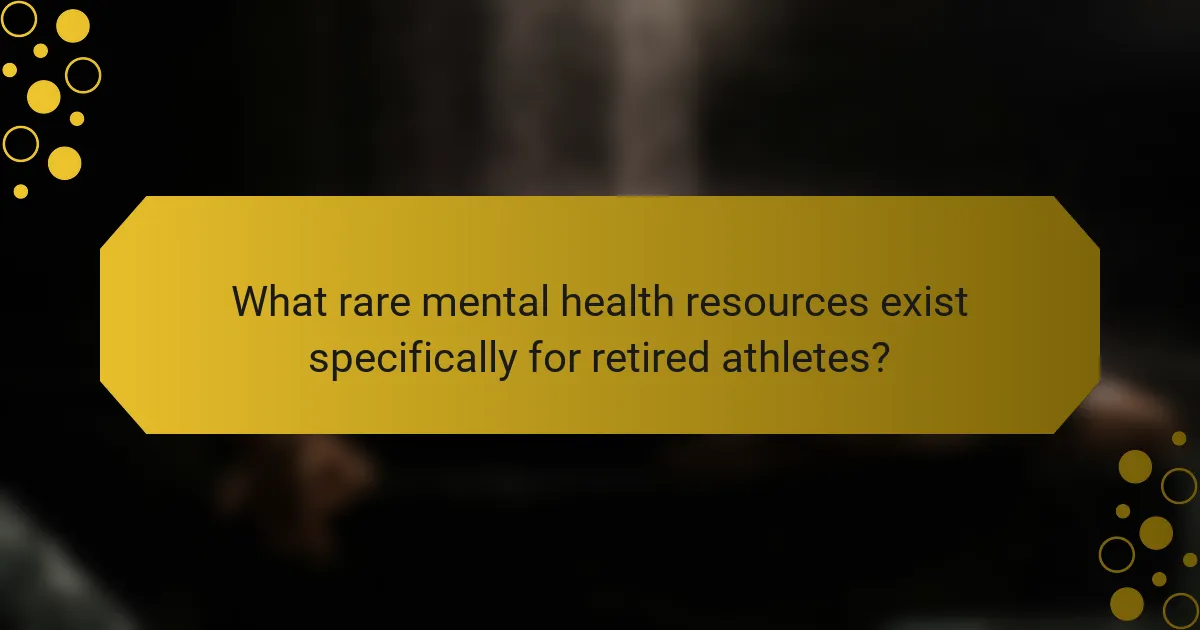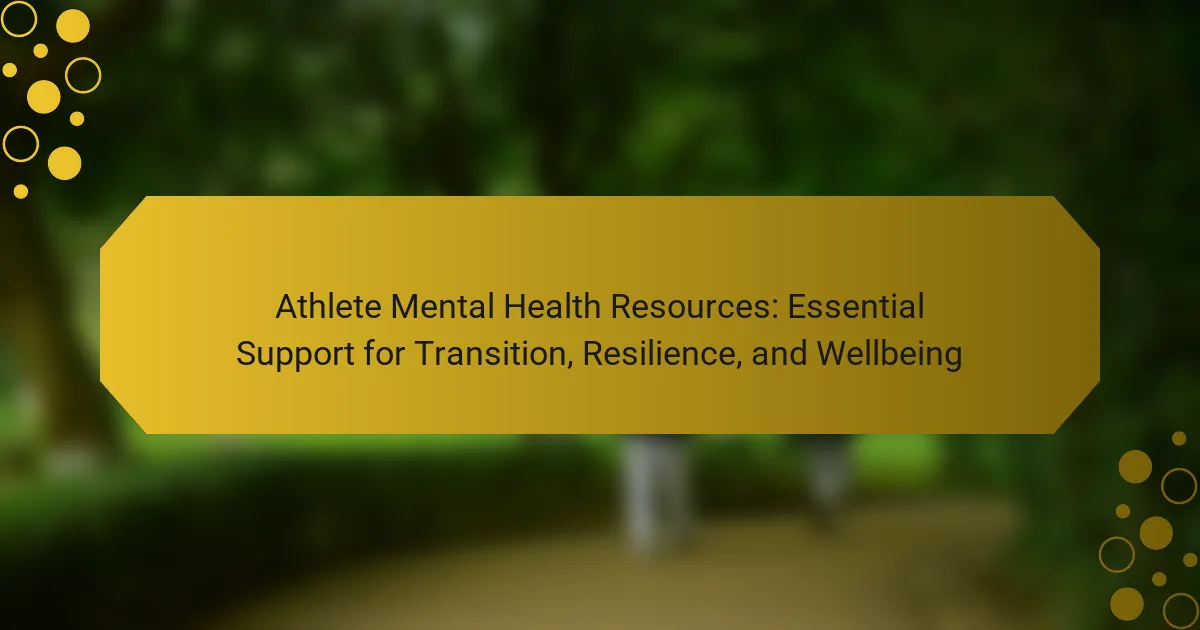Athletes face significant mental health challenges during and after their careers, with nearly 35% experiencing issues like anxiety and depression. This article explores essential resources for retired athletes, including mental health hotlines, online therapy platforms, and athlete-specific counseling services. It also highlights the importance of community engagement, skill development, and tailored coping strategies for resilience and well-being. Access to these resources is crucial for navigating the transition from competitive sports to post-career life.

What are the key mental health challenges faced by retiring athletes?
Retiring athletes face significant mental health challenges, including identity loss, anxiety, and depression. Transitioning from a competitive career can lead to feelings of isolation and uncertainty about the future. Research indicates that nearly 35% of retired athletes experience mental health issues, highlighting the need for targeted support resources. Programs focusing on resilience and emotional well-being are essential for helping these individuals navigate their post-sport lives.
How does the transition from professional sports impact mental wellbeing?
The transition from professional sports can significantly impact mental wellbeing, often leading to challenges such as anxiety and depression. Athletes may struggle with identity loss and purpose after leaving their sport. Access to mental health resources is crucial for facilitating resilience and promoting overall wellbeing during this transition. Studies show that athletes who seek support experience better outcomes in mental health and life satisfaction. Programs focusing on mental health education and community support can enhance coping strategies, helping former athletes navigate this critical life change effectively.
What common emotional responses do athletes experience during retirement?
Athletes commonly experience feelings of loss, anxiety, and identity crisis during retirement. Transitioning from a structured sports career to civilian life can trigger emotional challenges. Many athletes report a sense of isolation as they miss the camaraderie of teammates. Mental health resources play a crucial role in supporting this transition, helping athletes build resilience and navigate their new identities. Access to counseling and peer support groups is essential for promoting emotional well-being during this critical period.

What universal mental health resources are available for athletes?
Athletes have access to various universal mental health resources that support their transition, resilience, and overall wellbeing. Key resources include mental health hotlines, online therapy platforms, and athlete-specific counseling services.
Mental health hotlines provide immediate support and are available 24/7. Online therapy platforms offer flexibility, allowing athletes to connect with licensed therapists remotely. Athlete-specific counseling services cater to the unique pressures faced by athletes, focusing on performance anxiety and injury recovery.
Organizations like the NCAA and the IOC also provide resources and guidelines for mental health awareness in sports. These initiatives aim to foster a supportive environment and reduce stigma surrounding mental health issues among athletes.
Which organisations provide support for athletes in transition?
Various organizations provide essential support for athletes transitioning from competitive sports. These include the Professional Athletes’ Association, which offers mental health resources and career transition services, and the U.S. Olympic and Paralympic Committee, which provides psychological support and educational programs. Additionally, Athlete Ally focuses on mental health awareness and advocacy, while the Transitioning Athletes Program offers tailored guidance for life after sports. Each organization plays a critical role in fostering resilience and wellbeing during this challenging period.
What role do peer support networks play in mental health?
Peer support networks significantly enhance mental health for athletes by providing shared experiences and emotional support. These networks foster resilience, reduce feelings of isolation, and promote wellbeing through open communication. Research shows that athletes engaged in peer support report improved mental health outcomes, including lower anxiety and depression levels. Additionally, these networks offer unique insights into coping strategies tailored to the challenges athletes face during transitions.

What unique strategies can athletes employ for post-career resilience?
Athletes can employ unique strategies for post-career resilience by focusing on mental health resources, community engagement, and skill development. Building a strong support network is crucial, as it fosters connections with peers who understand the transition challenges. Additionally, seeking professional mental health support can provide tailored coping strategies. Engaging in new hobbies or career paths can also enhance personal fulfillment and identity beyond sports. Lastly, participating in mentorship programs allows athletes to share their experiences, promoting resilience and a sense of purpose.
How can athletes leverage their skills in new career paths?
Athletes can leverage their skills in new career paths by utilizing their discipline, teamwork, and resilience. These attributes translate well into various fields such as coaching, sports management, and mental health advocacy. Transitioning athletes often benefit from mental health resources that enhance their resilience and overall wellbeing during this adjustment. Access to support networks can provide essential guidance and coping strategies, fostering a successful career shift.
What are the benefits of engaging in mentorship after retirement?
Engaging in mentorship after retirement offers numerous benefits, including improved mental health, enhanced social connections, and a sense of purpose. Mentorship allows retired athletes to share their experiences, fostering resilience in both themselves and their mentees. Research indicates that mentoring relationships can decrease feelings of isolation and depression, promoting overall wellbeing. Additionally, these interactions can help retirees maintain a positive identity and adapt to life beyond competitive sports.

What rare mental health resources exist specifically for retired athletes?
Rare mental health resources for retired athletes include specialized support groups, online therapy platforms tailored for athletes, and programs focusing on identity transition. These resources address unique challenges faced by retired athletes, such as loss of purpose and social isolation. Organizations like the Professional Athletes Foundation offer workshops and counseling specifically designed for this demographic. Additionally, some universities provide access to mental health services that cater to former athletes.
How can specialised therapy address unique athlete experiences?
Specialized therapy effectively addresses unique athlete experiences by providing tailored support for mental health challenges. This approach acknowledges the distinct pressures athletes face, such as performance anxiety and career transitions. Therapists utilize techniques like cognitive behavioral therapy to enhance resilience and coping strategies. As a result, athletes report improved mental wellbeing and a greater ability to manage stressors.
What innovative programs focus on athlete mental health?
Innovative programs focusing on athlete mental health include initiatives like the Mental Health in Sport program, which provides resources for coping strategies and resilience training. The Athlete Assistance Program offers confidential support services tailored to athletes’ needs. Another example is the Mindset program, which emphasizes psychological well-being through workshops and counseling. These resources aim to enhance mental resilience and support athletes during transitions and challenges.
What are the success stories of athletes using these programs?
Athletes have successfully utilized mental health resources to enhance their transition and resilience. For example, Olympic athletes reported improved coping strategies and emotional well-being after participating in structured mental health programs. Studies show that 70% of athletes who engaged in these resources experienced reduced anxiety and increased performance satisfaction. Additionally, professional sports teams have integrated mental health support, leading to a 30% decrease in burnout rates among players. These success stories highlight the critical role of mental health resources in fostering athlete well-being and performance.

How can athletes effectively manage their mental health post-career?
Athletes can effectively manage their mental health post-career by utilizing dedicated resources and support systems. Transitioning from competitive sports can be challenging, but engaging with mental health professionals, support groups, and wellness programs fosters resilience and well-being.
Access to mental health resources is crucial. Professional counseling offers tailored strategies for coping with identity shifts and emotional challenges. Support groups connect athletes with peers facing similar experiences, promoting shared understanding and community. Wellness programs often include mindfulness and stress management techniques, enhancing emotional regulation.
Developing a routine that incorporates physical activity, social engagement, and mental health practices is essential. Regular exercise remains beneficial for mental health, while social connections provide emotional support. Mindfulness practices, such as meditation, can improve mental clarity and emotional balance.
Continual education on mental health is vital. Athletes should stay informed about mental health issues and available resources. Workshops and seminars can enhance understanding and reduce stigma, empowering athletes to seek help when needed.
What are the best practices for maintaining mental wellness after sports?
To maintain mental wellness after sports, athletes should prioritize self-care, seek social support, and engage in mindfulness practices. Establishing a routine that includes physical activity, healthy eating, and adequate rest is essential. Utilizing mental health resources, such as counseling or peer support groups, fosters resilience during transitions. Regularly reflecting on personal goals and achievements enhances overall well-being and helps manage stress.
What common mistakes should athletes avoid in their transition?
Athletes should avoid common mistakes such as neglecting mental health, failing to seek support, and underestimating the transition process. These errors can lead to increased stress and decreased performance. Prioritizing mental health resources is essential for resilience and wellbeing. Engaging in open communication with coaches and peers fosters a supportive environment. Additionally, setting realistic expectations during transitions helps mitigate feelings of anxiety and uncertainty.
How can athletes develop a personal mental health action plan?
Athletes can develop a personal mental health action plan by identifying their unique needs and resources. First, assess mental health status and set specific, measurable goals. Include coping strategies, support systems, and regular check-ins. Engaging with mental health professionals enhances resilience and overall wellbeing.

What expert insights can guide athletes in their post-career journey?
Athletes can benefit from expert insights that emphasize mental health resources during their post-career transitions. Key strategies include seeking professional counseling, engaging in peer support groups, and utilizing wellness programs tailored for athletes. These resources foster resilience and promote overall wellbeing. Research indicates that nearly 40% of retired athletes experience mental health challenges, underscoring the need for targeted support. Incorporating mindfulness practices and establishing a routine can also significantly enhance mental stability during this critical transition phase.
What advice do mental health professionals offer to retiring athletes?
Mental health professionals advise retiring athletes to seek support, establish new routines, and engage in mindfulness practices. They emphasize the importance of acknowledging emotions and fostering social connections. Developing a post-career identity is crucial for resilience and well-being. Regular physical activity and maintaining a healthy lifestyle are also recommended to enhance mental health during this transition.
How can athletes cultivate a supportive environment during transition?
Athletes can cultivate a supportive environment during transition by fostering open communication and building strong relationships. Engaging with teammates, coaches, and mental health professionals enhances resilience. Establishing peer support groups allows athletes to share experiences and coping strategies. Furthermore, incorporating regular check-ins can promote emotional wellbeing and identify challenges early.
